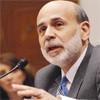Big investors driven to mortgage by Fed’s plan
Bloomberg

refid:11325915 ilişkili resim dosyası
Federal Reserve Chairman Ben S. Bernanke’s plan to buy $300 billion of Treasuries is driving the world’s biggest bond investors away from government debt and may already be helping him lower consumer borrowing rates.Mortgage and corporate securities are outperforming Treasuries this quarter for the first time since the period ended in June, before the collapse of Lehman Brothers Holdings Inc. drove investors to the safest debt and froze credit markets, Merrill Lynch & Co. index data show. A March 23 Ried, Thunberg & Co. survey said fund managers overseeing $1.19 trillion cut their government securities holdings to the least this year while they increased mortgage assets.
"We don’t think Treasuries are very thrilling," said Barr Segal, a managing director at Los Angeles-based TCW Group Inc., which holds $90 billion in fixed-income assets. Bernanke wants to keep Treasury rates low so "investors do what we’re doing, that is, jump in and drive all the spreads down," he said of the gap between yields of riskier assets and government debt.
By moving money out of Treasuries, TCW, along with Pacific Investment Management Co. and Fifth Third Asset Management, may be helping Bernanke, who said in a March 20 speech in Phoenix that "credit market dysfunction" is countering efforts to fix the economy. The Fed’s March 18 plan to buy Treasuries and $750 billion of mortgage-backed securities from Fannie Mae, Freddie Mac and Ginnie Mae is "intended to improve conditions in private credit markets," he said.
Bonds of industrial companies, a category that includes Bentonville, Arkansas-based Wal-Mart Stores Inc., Oak Brook, Illinois-based McDonalds Corp. and Pfizer Inc. in New York, yield 4.68 percentage points more than Treasuries, down from 5.57 percentage points at the start of the year, Merrill Lynch data show.
Yields on Washington-based Fannie Mae’s current-coupon 30-year fixed-rate mortgage bonds declined to 3.85 percent on March 19, the lowest in two months. The difference between the rates and those on 10-year Treasuries shrank to 1.18 percentage points last week, the narrowest since July 2007 and down from 2.32 percentage points in November.
Central bank policy makers are determined to lower consumer rates relative to interest paid by banks so Americans can increase spending and end the deepest recession since 1982.
Gross domestic product shrank 6.3 percent in the fourth quarter, the most since 1982, and the Commerce Department in Washington said March 27 that consumer spending growth slowed to 0.2 percent in February from 1 percent the prior month.
Consumer rates
Even with the Fed’s target rate for overnight loans between banks at zero to 0.25 percent, 30-year mortgages are 2.17 percentage points higher than the yield on 10-year Treasuries, or 0.63 point more than the past decade’s average, according to data compiled by Bankrate.com and Bloomberg. Car loans are 7.71 percentage points above the one-month London interbank offered rate that banks charge each other for loans, compared with the 1.92-point average, Fed data shows.
















